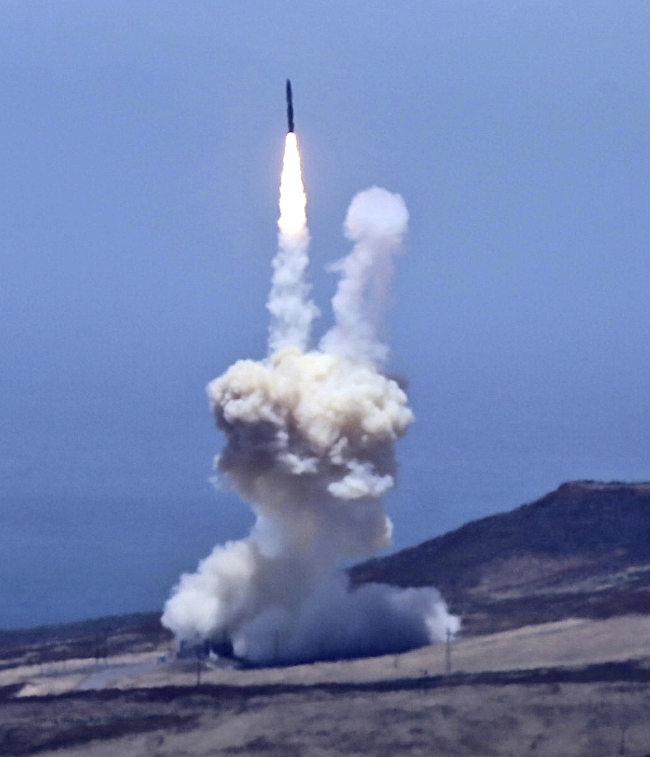US successfully shoots down incoming missile in first ICBM intercept test
By Im Eun-byelPublished : May 31, 2017 - 09:11
WASHINGTON -- The US successfully carried out its first-ever test to shoot down an oncoming intercontinental ballistic missile, the Pentagon said, as it steps up efforts to defend better against growing missile threats from North Korea.
"The US Missile Defense Agency successfully intercepted an intercontinental ballistic missile target during a test of the Ground-based Midcourse Defense element of the nation's ballistic missile defense system," the Defense Department said in a statement.
It was the first live-fire test against an ICBM-class target for the US ballistic missile defense system.

The test, which took place over the Pacific, came after a series of successful missile tests by the communist North that demonstrated steady progress in its pursuit of various types of missiles, including a nuclear-tipped ICBM capable of reaching the US.
"The intercept of a complex, threat-representative ICBM target is an incredible accomplishment for the GMD system and a critical milestone for this program," Missile Defense Agency Director Vice Adm. Jim Syring said in the statement.
"This system is vitally important to the defense of our homeland, and this test demonstrates that we have a capable, credible deterrent against a very real threat. I am incredibly proud of the warfighters who executed this test and who operate this system every day," he said.
During the test, an ICBM-class target was fired from the Ronald Reagan Ballistic Missile Defense Test Site in the Marshall Islands and a ground-based interceptor was launched from Vandenberg Air Force Base, California, and its exo-atmospheric kill vehicle "intercepted and destroyed the target in a direct collision," the statement said.
"Initial indications are that the test met its primary objective, but program officials will continue to evaluate system performance based upon telemetry and other data obtained during the test," it said.
Earlier in the day, Pentagon spokesman Navy Capt. Jeff Davis told reporters that ballistic missile proliferation continues to be a concern for the US as additional countries acquire a greater number of ballistic missiles.
Though Tuesday's test was not timed because of recent North Korean actions, Davis said the provocative regime is one of the reasons why the US has the capability.
"North Korea has expanded the size and the sophistication of its ballistic missile forces from close-range ballistic missiles to intercontinental ballistic missiles," he said. "They continue to conduct test launches, as we saw even this weekend, while also using dangerous rhetoric that suggests that they would strike the US homeland."
On Sunday, the North fired a short-range Scud-type missile off its east coast, which flew about 450 kilometers before crashing into the East Sea. The launch marked the North's ninth missile test this year and the third in about a week.
President Donald Trump has denounced the launch, saying the North has "shown great disrespect" for China, trying to calm the situation.
Concerns about North Korean nuclear and missile threats have deepened in the US since North Korean leader Kim Jong-un said in his New Year's Day address that the country is ready to test-fire an intercontinental ballistic missile apparently capable of reaching the US.
Pyongyang has conducted five nuclear tests since 2006 and a number of long-range missile tests since 1998. Analysts warn it's only a matter of time for the North to combine the two technologies and perfect the capability to deliver nuclear weapons to the continental US. (Yonhap)


















![[KH Explains] Hyundai's full hybrid edge to pay off amid slow transition to pure EVs](http://res.heraldm.com/phpwas/restmb_idxmake.php?idx=652&simg=/content/image/2024/04/18/20240418050645_0.jpg&u=20240418181020)

![[Today’s K-pop] Zico drops snippet of collaboration with Jennie](http://res.heraldm.com/phpwas/restmb_idxmake.php?idx=642&simg=/content/image/2024/04/18/20240418050702_0.jpg&u=)